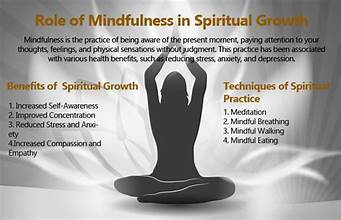In an era where the pace of life seems relentless and the digital landscape continually evolves, many individuals are turning to mindfulness and spiritual growth practices as a means to find balance, purpose, and inner peace. As we progress through 2024, these practices are not just fleeting trends but transformative tools that are reshaping lives. This article explores how mindfulness and spiritual growth are impacting individuals in profound ways and how these practices are becoming integral to modern living.
Understanding Mindfulness and Spiritual Growth
What is Mindfulness?
Mindfulness is the practice of being fully present and engaged in the current moment, free from judgment. Rooted in ancient contemplative traditions, particularly within Buddhism, mindfulness involves paying attention to one’s thoughts, feelings, and sensations with a sense of curiosity and acceptance. The goal is to cultivate a deep awareness of the present moment, which can lead to reduced stress, enhanced emotional regulation, and overall well-being.
Spiritual Growth Defined
Spiritual growth, on the other hand, encompasses the journey of expanding one’s understanding of their inner self and the universe. It involves practices that deepen one’s connection to their own spirituality, whatever that may be. This can include meditation, prayer, reflective journaling, or engaging with philosophical or religious teachings. Spiritual growth is often about finding meaning, purpose, and a sense of connection to something greater than oneself.
The Rise of Mindfulness and Spiritual Practices in 2024
Increased Popularity and Integration
In 2024, mindfulness and spiritual growth practices have gained significant traction across various sectors. Businesses, schools, and healthcare providers are incorporating these practices into their routines to enhance productivity, foster emotional resilience, and promote overall well-being. This mainstream acceptance reflects a growing recognition of the benefits these practices offer in navigating the complexities of modern life.
Scientific Validation and Research
Recent research supports the benefits of mindfulness and spiritual practices, contributing to their growing popularity. Studies have shown that regular mindfulness practice can reduce symptoms of anxiety and depression, improve focus and cognitive function, and enhance overall emotional health. Additionally, spiritual practices have been linked to increased life satisfaction, improved relationships, and greater resilience in the face of challenges.
How Mindfulness and Spiritual Practices Are Transforming Lives
Enhancing Mental Health
One of the most significant impacts of mindfulness is its positive effect on mental health. By promoting present-moment awareness and non-reactivity, mindfulness helps individuals manage stress, reduce anxiety, and improve emotional regulation. Many people report feeling more grounded and less overwhelmed by life’s pressures as a result of their mindfulness practices.
Fostering Personal Growth
Spiritual growth practices encourage individuals to explore their inner selves and understand their values and purpose. This journey of self-discovery can lead to greater self-awareness and personal development. Individuals often find that by connecting with their inner selves, they gain clarity about their life goals, improve their decision-making abilities, and enhance their overall sense of fulfillment.
Improving Relationships
Mindfulness and spiritual growth can also positively impact relationships. Mindfulness encourages individuals to be present and attentive in their interactions, which can lead to more meaningful and empathetic connections with others. Spiritual practices, such as compassionate communication and reflective listening, foster deeper understanding and connection in relationships.
Promoting Physical Health
The benefits of mindfulness extend beyond mental and emotional well-being to physical health. Practices like mindful eating and mindful movement (e.g., yoga or tai chi) contribute to healthier lifestyle choices and improved physical health. Research indicates that mindfulness can also help manage chronic pain and improve the quality of life for individuals with various health conditions.
Practical Tips for Incorporating Mindfulness and Spiritual Growth into Daily Life
Start Small and Be Consistent
For those new to mindfulness and spiritual practices, starting small and being consistent is key. Begin with short, manageable practices, such as a few minutes of meditation each day or simple breathing exercises. Gradually increase the time and complexity of your practices as you become more comfortable.
Create a Dedicated Space
Having a dedicated space for mindfulness and spiritual practices can enhance the experience. This space should be quiet, comfortable, and free from distractions. It can serve as a physical reminder to engage in your practices regularly.
Integrate Mindfulness into Daily Activities
Mindfulness doesn’t have to be confined to formal practice sessions. Incorporate mindfulness into daily activities, such as eating, walking, or even washing dishes. Pay attention to your senses and the present moment, and use these moments as opportunities for mindfulness.
Explore Different Practices
There are various mindfulness and spiritual practices to explore, including meditation, yoga, journaling, and nature walks. Experiment with different practices to find what resonates with you and fits your lifestyle.
Seek Community and Support
Joining a mindfulness or spiritual growth community can provide support and motivation. Whether through online forums, local groups, or workshops, connecting with others who share similar interests can enhance your practice and provide valuable insights.
The Future of Mindfulness and Spiritual Practices
As we move further into 2024 and beyond, the integration of mindfulness and spiritual growth practices into daily life is expected to continue growing. With increasing awareness of their benefits and the expanding availability of resources and tools, more individuals will likely embrace these practices as essential components of a balanced and fulfilling life.
Technological Innovations
The advancement of technology is also playing a role in making mindfulness and spiritual practices more accessible. Mobile apps, virtual reality experiences, and online courses offer innovative ways to engage with these practices, making them easier to integrate into busy lifestyles.
Global Trends
Globally, there is a rising trend toward incorporating mindfulness and spiritual practices into various aspects of life, from corporate wellness programs to educational curricula. This widespread adoption reflects a collective shift towards valuing mental, emotional, and spiritual well-being.
Conclusion
In 2024, mindfulness and spiritual growth practices are transforming lives by offering individuals tools to navigate the complexities of modern life with greater ease and clarity. As more people discover the profound benefits of these practices, they are becoming integral to personal and professional well-being. Embracing mindfulness and spiritual growth is not just a trend but a meaningful journey towards a more balanced, fulfilling, and connected life


